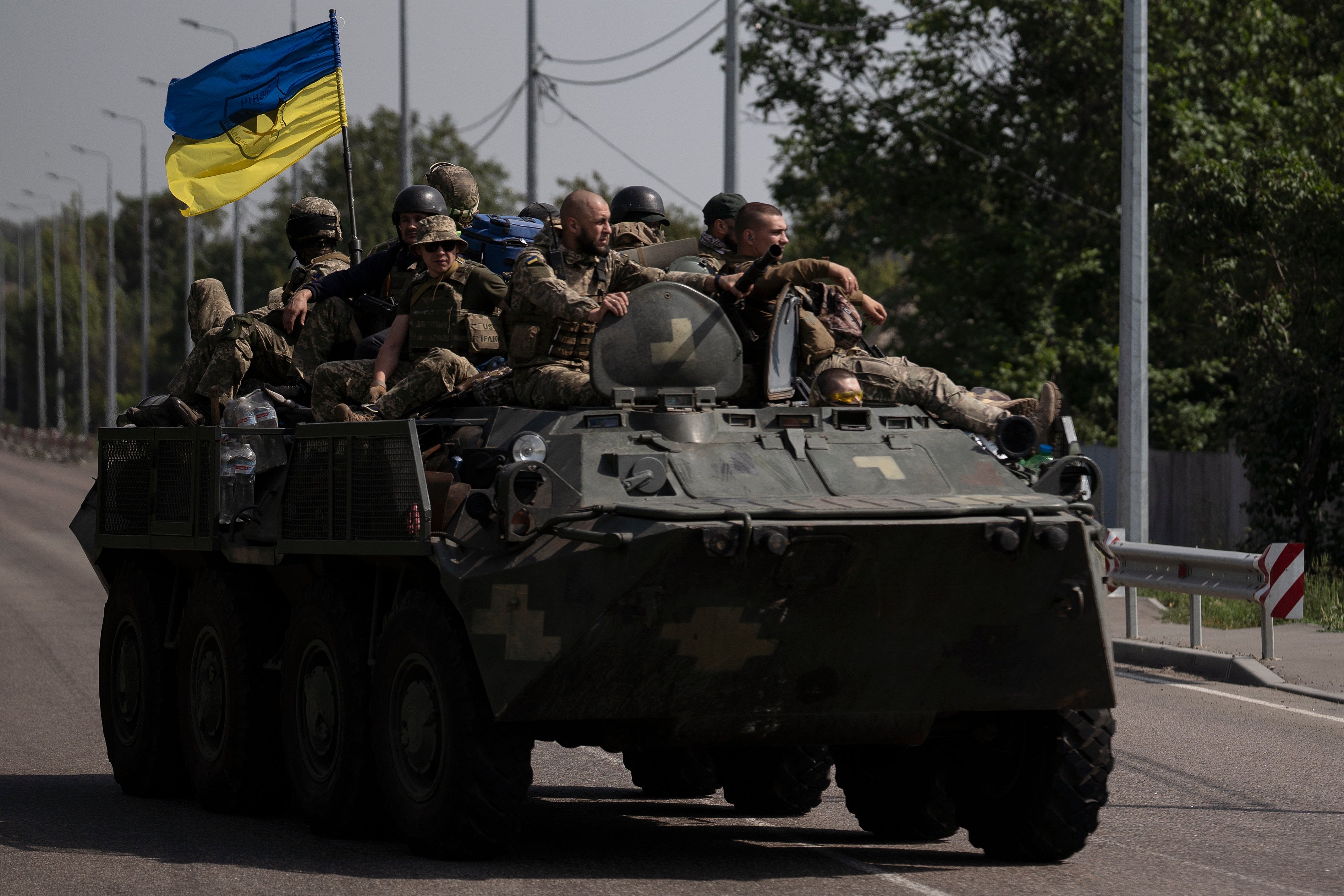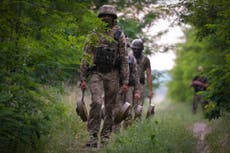Ukraine claims its troops are within 30 miles of Russian border as Kyiv makes further gains
‘The Russian army ... is demonstrating the best that it can do, showing its back’, crows President Zelensky

Ukrainian troops pushed to within 30 miles of the Russian border on Sunday, said officials, as Kyiv’s counteroffensive continued to make gains on the 200th day of the war.
A jubilant Ukrainian president Volodymyr Zelensky mocked Moscow in a video address, saying “the Russian army in these days is demonstrating the best that it can do, showing its back”.
Ukraine’s quick action to reclaim Russia-occupied areas in the northeastern Kharkiv region forced Moscow to withdraw its troops to prevent them from being surrounded and leave behind significant numbers of weapons and munitions in a hasty retreat.
On Sunday, the president also posted a video of Ukrainian soldiers hoisting the national flag over Chkalovske, another town they reclaimed from the Russians in the counteroffensive.
Ukraine’s military chief, General Valerii Zaluzhny, said Ukraine has liberated about 1,160 square miles since the beginning of September and was within some 30 miles of the border with Russia.
The pullback by Moscow’s forces marked the biggest battlefield success for Ukrainian forces since they thwarted a Russian attempt to seize the capital, Kyiv, at the start of the war in February.
Ukraine’s attack in the Kharkiv region came as a surprise for Moscow, which had relocated many of its troops from the area to the south in expectation of the main Ukrainian counteroffensive there.
In an awkward attempt to save face, the Russian Defence Ministry said the troops’ withdrawal from Izyum and other areas in the Kharkiv region was intended to strengthen Russian forces in the neighbouring Donetsk region to the south.
The group of Russian forces around Izyum has been key to Moscow’s effort to capture the Donetsk region, and the pullback will now dramatically weaken the Russian capability to press its offensive to Ukrainian strongholds of Sloviansk and Kramatorsk just to the south.
Igor Strelkov, who led Russia-backed separatists in the early months of the conflict in the Donbas when it erupted in 2014, mocked the Russian Defence Ministry’s explanation of the retreat, suggesting that handing over Russia’s own territory near the border to Ukraine was a “contribution to Ukrainian settlement”.
The retreat drew angry comments from Russian military bloggers and nationalist commentators, who bemoaned it as a major defeat and urged the Kremlin to respond by stepping up war efforts.
Many scathingly criticised Russian authorities for continuing with fireworks and other lavish festivities in Moscow that marked a city holiday on Saturday despite the debacle in Ukraine. There were also reports of some local Russian councils calling on President Vladimir Putin to resign, in a potential sign of growing internal opposition to the all-powerful leader.
Pro-Kremlin political analyst Sergei Markov criticised the festivities in Moscow as a grave political mistake.
“The fireworks in Moscow on a tragic day of Russia’s military defeat will have extremely serious political consequences,” Mr Markov wrote on his messaging app channel.
“Authorities mustn’t celebrate when people are mourning.”
In a sign of a potential rift in the Russian leadership, Ramzan Kadyrov, the Kremlin-backed leader of Chechnya, said the retreat from the Kharkiv region resulted from the Russian military leadership’s blunders.
“They have made mistakes and I think they will draw the necessary conclusions,” Mr Kadyrov said.
“If they don’t make changes in the strategy of conducting the special military operation in the next day or two, I will be forced to contact the leadership of the Defence Ministry and the leadership of the country to explain the real situation on the ground.”
Despite Ukraine’s gains, the US secretary of state Antony Blinken and Jens Stoltenberg, secretary-general of Nato, warned the war would still likely drag on for months.
In another major development on Sunday, the Zaporizhzhia nuclear power plant, Europe’s largest, was reconnected to Ukraine’s electricity grid, allowing engineers to shut down its last operational reactor in an attempt to avoid a radiation disaster as fighting rages in the area.
For several previous days, the plant was operating in “island mode”, with just one of its six reactors working to power cooling systems and other crucial equipment.
(With agencies)
Join our commenting forum
Join thought-provoking conversations, follow other Independent readers and see their replies
Comments


Bookmark popover
Removed from bookmarks